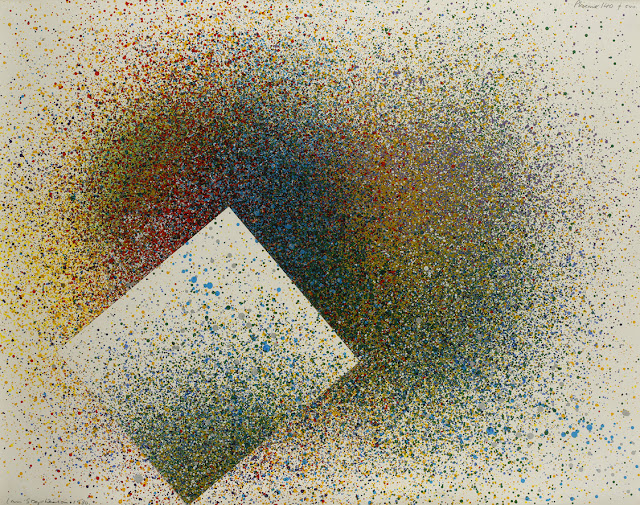Ian Stephenson (1934 – 2000) was an English abstract artist.
Stephenson trained at King's College, Durham along with Noel Forster and had his first solo show in London at the New Vision Centre in 1958. An exhibition of his work was exhibited at the Hayward Gallery in 1977 and his work can be found in the collections of the Tate, the British Council and Whitworth Art Gallery. His work was also featured in the 1966 film, Blow-Up by Michelangelo Antonioni.
Stephenson's work was characteristically made by splattering droplets of paint onto paper or canvas and repeating this with many different colours. Because the layers are applied quite widely the effect created in the finished paintings is determined not only by the colour and quantity of the spots of paint, but by the order in which they were applied.
"I love the tradition of an albion art and really my paintings have more to do with Constable’s snow than Tobey’s white writing. I have always known how I was to make pictures and speculations about the nature of painting stem from the style. The practice of painting is a defined discipline and desirably difficult.
Annealing and concealing colour. All of painting is camouflage, not least of all by means of subject matter whatever the sentiment. It is within the freaked skin of camouflage that the art resides. To be blessed with the contradictory nature of things. If there is no alternative to the way things are, then the picture must be more and more of what it is. Neural and neutral, the greyness scintillates. Overlapping and obliterated. Oblivion. Such is the practice of palimpsestial painting. Alas, it is as dilemmic as remembering to forget."( Ian Stephenson /ianstephenson.net)
Stephenson trained at King's College, Durham along with Noel Forster and had his first solo show in London at the New Vision Centre in 1958. An exhibition of his work was exhibited at the Hayward Gallery in 1977 and his work can be found in the collections of the Tate, the British Council and Whitworth Art Gallery. His work was also featured in the 1966 film, Blow-Up by Michelangelo Antonioni.
Stephenson's work was characteristically made by splattering droplets of paint onto paper or canvas and repeating this with many different colours. Because the layers are applied quite widely the effect created in the finished paintings is determined not only by the colour and quantity of the spots of paint, but by the order in which they were applied.
"I love the tradition of an albion art and really my paintings have more to do with Constable’s snow than Tobey’s white writing. I have always known how I was to make pictures and speculations about the nature of painting stem from the style. The practice of painting is a defined discipline and desirably difficult.
Annealing and concealing colour. All of painting is camouflage, not least of all by means of subject matter whatever the sentiment. It is within the freaked skin of camouflage that the art resides. To be blessed with the contradictory nature of things. If there is no alternative to the way things are, then the picture must be more and more of what it is. Neural and neutral, the greyness scintillates. Overlapping and obliterated. Oblivion. Such is the practice of palimpsestial painting. Alas, it is as dilemmic as remembering to forget."( Ian Stephenson /ianstephenson.net)
















No comments:
Post a Comment